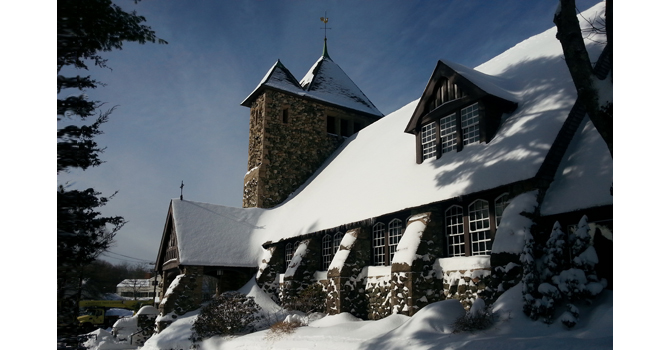There’s a lot of talk these days about the declining state of the Christian church in America. I serve a medium-sized church in small-town New England, a region where the numbers look particularly grim.
The latest numbers show that mainline Protestants in the Boston area make up about 13 percent of the population -- with “nones” now at 33 percent and climbing.
It might be easy to argue that traditional Protestant churches like mine are losing their edge because they’re too resistant to change, even too stodgy.
This criticism is especially acute in New England, where most churches have been around longer than the Constitution. For a Midwestern transplant like me, this kind of longevity took some getting used to.
If you’d told me a few years ago that one day my job would entail honoring the town’s 300th anniversary by putting on a pilgrim costume, complete with bonnet, and giving tours of a stone tower housing a church bell made by Paul Revere’s foundry in 1801, I might not have believed you.
It’s true that churches steeped in that kind of history take a long time to change. We have to consult the town’s historic committee just to change our landscaping.
It’s also true that churches steeped in that kind of history take a long time to erode. When I lead worship in our dark-wood sanctuary, I sense that I am standing on the shoulders of generations of faithful congregants who loved this place and this church, generations who survived tidal waves of social, political and religious change.
Strength of history isn’t the only thing New England churches have going for them. There’s also the powerful factor of town charm. Mine in particular, although only a 20-minute drive from downtown Boston, is rural enough that residents regularly rely on backyard generators to provide electricity during storms.
The police have been known to make automated phone calls to the entire town warning them of a loose fox with rabies or a bear who’s wandered through the region (“Please bring in your bird feeders”). In winter, two temporary ice rinks are set up on the Town Green, which is surrounded by little 10-foot hills that crowd with bundled-up sledders.
Every Monday, the senior minister and I hold “office hours” at the local coffee shop. Although we aren’t guaranteed visits from our parishioners, we can always rely on getting to wave to the fire chief as he walks by on his way to lunch -- same time every day, like clockwork.
But of all the town’s features, the Dump is definitely my favorite. Although I’ve never heard it referred to in any other way, it’s not actually a dump. It’s more of a goods trading center, where people drop off unwanted items -- books, furniture, art, lamps, printers -- that others are free to take.
On weekends when the weather is nice, the Dump is the center of town social life, the place where people delight in running into neighbors. People talk about it the way some might talk about their beloved local bar. But of course, this is a dry town. We don’t have any bars; we have the Dump.
I find the Dump to be a very important -- and hopeful -- reality about community life here.
In many ways, it’s an unexpected fit for one of the wealthiest towns in Massachusetts, where residents are ambitious and successful: doctors, professors, lawyers, investors. It’s not the kind of place where you’d expect to find people spending cheerful Saturday afternoons sifting through donated junk and chatting with their friends. Yet frequently when I visit parishioners’ homes, they will show me their greatest Dump finds with pride, and I am often invited to ride along on Dump outings.
The Dump serves as a reminder for me that community can be found in the most unlikely of places. Many of our parishioners attend church only sporadically, and I often hear grumbling about how they aren’t committed to building deep relationships with one another, how they’re too busy working or vacationing to come to church.
But I believe they do actually want to know each other. That’s why they hang out at the Dump! It’s certainly not because they need the extra home furnishings.
All people, everywhere, have spiritual needs. This is as true in the elite towns of New England, where traditional religious practice appears to be losing its prominence, as it is in the regions of our country where church attendance is soaring. It’s just that in some places, those needs are harder to recognize and to meet.
We must all come to love authentically the particularities -- both frustrating and charming -- of the communities where we live and work. Church leaders cannot forget, regardless of the climate in which we lead, the reality that people still yearn deeply for connection, community and meaning.
They can find those things at the town Dump. It’s up to us to make sure they can find them at our churches, too.













